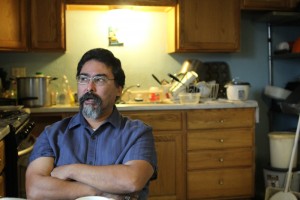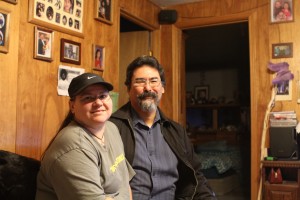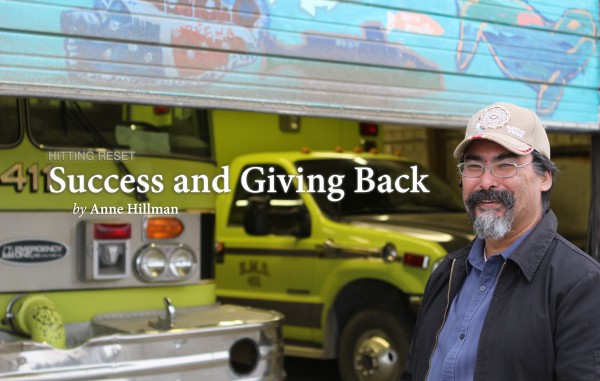This is the fifth story in a five-part series looking at prison re-entry. Want more? Alaska Public Media hosted a live community forum on Thursday, Dec. 3, at 7:00 p.m. to dig deeper into life after prison. Listen on Monday, Dec. 7, at 7 p.m. on KSKA-Anchorage, 91.1FM.
Restarting life after prison is full of challenges — but also successes. For our final story in the series “Hitting Reset,” we travel to the village of Tyonek on Cook Inlet where one man recreates himself and gives back to the community he hurt.
When Lecon Chuitt, Jr. first joined the Tyonek Volunteer Fire Department this summer, the cavernous garage that housed the aging equipment was a mess. Gear was on the floor, one of the garage doors didn’t open, and only a few lights worked.

“The firefighters were coming in and getting dressed in practically darkness,” he recalled. “They would open the doors (to let in light). My question was, ‘What are you going to do when winter comes around?’ They said, ‘Well, we’ve got flashlights.’”
So Lecon raised money through Facebook to buy new lights. Then he set to work fixing the doors, repairing the trucks, and getting the heater to work again.
“I just Google everything and I say, ‘hmm, I can do that.’ And I just start doing it.”
Lecon, who also goes by Tim, Timothy, and Lee, was not always Mr. Helpful.
As we walked down one of Tyonek’s six streets, he pointed out a few buildings, like the old tribal center.
“There’s a little opening right there. I’d climb up there, get into the attic, and steal stuff.”
He’d take money or food from houses and shops.

Lecon said he started out stealing food with his cousin when he was 8. By that point, he and his siblings had already been in and out of the foster care system because his parents were alcoholics. They first lost custody of the kids when Lecon was about 6.
Over and over when he told bits of his story, he blamed himself for things gone wrong. He said his actions as a small child triggered investigations into the family, and his actions got his siblings separated again and again.
When he was 10, he was arrested for the first time for stealing a motorcycle. He got sent to McLaughlin Youth Center in Anchorage for three days. By his mid-teens he was stealing regularly, drinking, and also using pot.
“I stole things because I wanted them,” he said. “At that time I believed that my life was so crappy that people could afford to give something to me. I think I expected things.”
So he just took them.
Lecon’s older cousin, Jane Standifer, looked after him throughout his childhood. She said he wasn’t always a thief.
“He was a pretty good kid. He was always curious,” she said. “He would take radios and all different things apart. And we were like, ‘Timothy, what are you doing?’ We used to call him Tim then. And he would say, ‘Oh, I’m trying to figure out how it works.’”
Jane said it was hard when he left the village and ended up in prison. “It really hurt. You know, missing all those years with him, and watching him grow. I almost want to cry now…”
According to Lecon, his first few experiences with incarceration had no impact on his behavior. He didn’t bother taking any classes or trying to get sober.
“I didn’t do very much different. I pretty much just smoked weed and drank homebrew.”
He’d leave prison, he’d steal again, and he’d go back. He even escaped twice. Finally, in December of 1992, he was caught for armed robbery in Fairbanks and sentenced to 29 years in prison with nine suspended. For the first year, he was in segregation because of his escapes and was only allowed outside of his tiny cell for two hours per day.
“We had other inmates (in seg). We could yell up and down the halls. So we would have conversations basically lying on our bellies talking underneath the door.”
They’d talk about their lives, the inadequacies of the system, and computers because one guy liked computers. So Lecon started getting magazines and teaching himself about them. Eventually, he got out of the hole, was sent to Arizona, and started taking classes. He studied cultural anthropology and learned to make jewelry. He said he learned social skills and how to be a gentleman by watching PBS. And he met a counselor who finally helped him understand the impacts of his actions.
“The things I thought were little made a big impact on people’s lives. If you go into their homes, you take away more than people’s possessions, you take away their safety.”
As we walked toward the clinic where Lecon now works as the EMS coordinator, he talked about learning to rechannel his skills. He says he kept repeating one thing to himself:
“There were people who talked to me who said, ‘You are better than this. You’re smart. You can lead this village one day.’ They saw something that I wasn’t seeing.”
When Lecon started seeing it, he sobered up, became a mentor in prison, and in 2006, was released to Anchorage. He said he didn’t want to come straight back to Tyonek because he still had things to work on.
He said wanted, “to make sure I am comfortable with who I am before I come back home. ‘Cause I don’t want to bring a mess back home and start over where I was.”
He started with a job at IHOP and eventually spent seven years at the Food Bank of Alaska. But this summer, he decided it was time to move home and take care of his mother.
The volunteer firefighters didn’t know what to expect when Lecon showed up to join the crew. But Gwen Chickalusion said they quickly warmed up to him — having ‘Tim the Tool-man’ around helped morale.
“Yeah, it’s a lot better,” Gwen said with emphasis. “We come in, we turn the lights on. It gets bright. It’s not dim any more. The door will open when we push a button. And the door opens and closes on the truck. Because before, I wasn’t gonna try and fix it.”
Lecon says once he started fixing things, people pitched in to get the fire station in order. One afternoon he arrived as they finished up organizing.
“They moved the trucks back in, and I just walked around and I thought, ‘This is a new home for me.’”
Lecon’s come full circle, back to the village of his childhood where he was kind and curious, still taking things apart to see how they work.
Anne Hillman is the healthy communities editor at Alaska Public Media and a host of Hometown, Alaska. Reach her atahillman@alaskapublic.org. Read more about Annehere.






